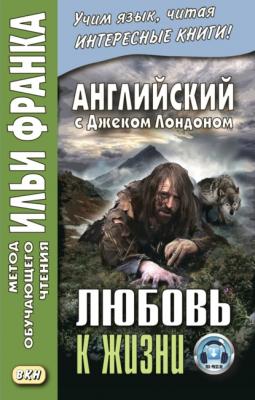Английский с Джеком Лондоном. Любовь к жизни / Jack London. Love of Live. Джек Лондон
Читать онлайн.| Название | Английский с Джеком Лондоном. Любовь к жизни / Jack London. Love of Live |
|---|---|
| Автор произведения | Джек Лондон |
| Жанр | Иностранные языки |
| Серия | Метод обучающего чтения Ильи Франка |
| Издательство | Иностранные языки |
| Год выпуска | 2020 |
| isbn | 978-5-7873-1540-0 |
The bottom of the valley was soggy with water, which the thick moss held, spongelike, close to the surface. This water squirted out from under his feet at every step, and each time he lifted a foot the action culminated in a sucking sound as the wet moss reluctantly released its grip. He picked his way from muskeg to muskeg, and followed the other man’s footsteps along and across the rocky ledges which thrust like islets through the sea of moss.
Though alone, he was not lost (хоть и один, он не заблудился; to lose – терять; проигрывать; lost – потерянный, заблудившийся). Farther on he knew he would come to where dead spruce and fir, very small and weazened (дальше, он знал, он придет к тому месту, где мертвые ели и пихты, очень маленькие и высохшие), bordered the shore of a little lake, the titchin-nichilie (окаймляют берег небольшого озера «тичин-ничили»), in the tongue of the country, the “land of little sticks (на языке этой местности «земля прутиков»; stick – палка, прут).” And into that lake flowed a small stream (а в то озеро впадала маленькая речушка), the water of which was not milky (вода которой не была молочно-мутной). There was rush-grass on that stream (на той речке был = рос тростник) – this he remembered well (это он помнил хорошо) – but no timber (но никакого леса; timber – лесоматериалы; строевой лес; древесина), and he would follow it till its first trickle ceased at a divide (и он будет идти по ней, пока ее первая струйка не закончится на водоразделе; to cease – переставать /делать что-либо/, прекращать/ся/). He would cross this divide to the first trickle of another stream (он перейдет этот водораздел до первой струйки другого потока), flowing to the west (текущего на запад), which he would follow (за которым он будет идти) until it emptied into the river Dease (пока тот не впадет в реку Диз), and here he would find a cache under an upturned canoe and piled over with many rocks (и здесь он найдет /тайный/ запас = припасы под перевернутым каноэ и заваленный большим количеством камней; to pile over – заваливать, наваливать; pile – куча, груда). And in this cache would be ammunition for his empty gun (а в этом запасе будут боеприпасы для его пустого ружья), fish-hooks and lines, a small net (рыболовные крючки и лески, небольшая сеть) – all the utilities for the killing and snaring of food (все полезные вещи для убийства и ловли еды; snare – западня, капкан, ловушка, силок; to snare – поймать в ловушку, силки /птицу, небольшого зверька/). Also, he would find flour (также он найдет муку), – not much (немного), – a piece of bacon, and some beans (кусок бекона и немного бобов).
Though alone, he was not lost. Farther on he knew he would come to where dead spruce and fir, very small and weazened, bordered the shore of a little lake, the titchin-nichilie, in the tongue of the country, the “land of little sticks.” And into that lake flowed a small stream, the water of which was not milky. There was rush-grass on that stream – this he remembered well – but no timber, and he would follow it till its first trickle ceased at a divide. He would cross this divide to the first trickle of another stream, flowing to the west, which he would follow until it emptied into the river Dease, and here he would find a cache under an upturned canoe and piled over with many rocks. And in this cache would be ammunition for his empty gun, fish-hooks and lines, a small net – all the utilities for the killing and snaring of food. Also, he would find flour, – not much, – a piece of bacon, and some beans.
Bill would be waiting for him there (Билл будет ждать его там), and they would paddle away south down the Dease to the Great Bear Lake (и они уплывут на лодке на юг вниз по течению Диз к Большому Медвежьему озеру). And south across the lake they would go (и они поплывут на юг через озеро), ever south (все время на юг), till they gained the Mackenzie (пока не доберутся до Макензи). And south, still south, they would go (и они будут двигаться на юг, все еще на юг), while the winter raced vainly after them (в то время как зима будет напрасно
